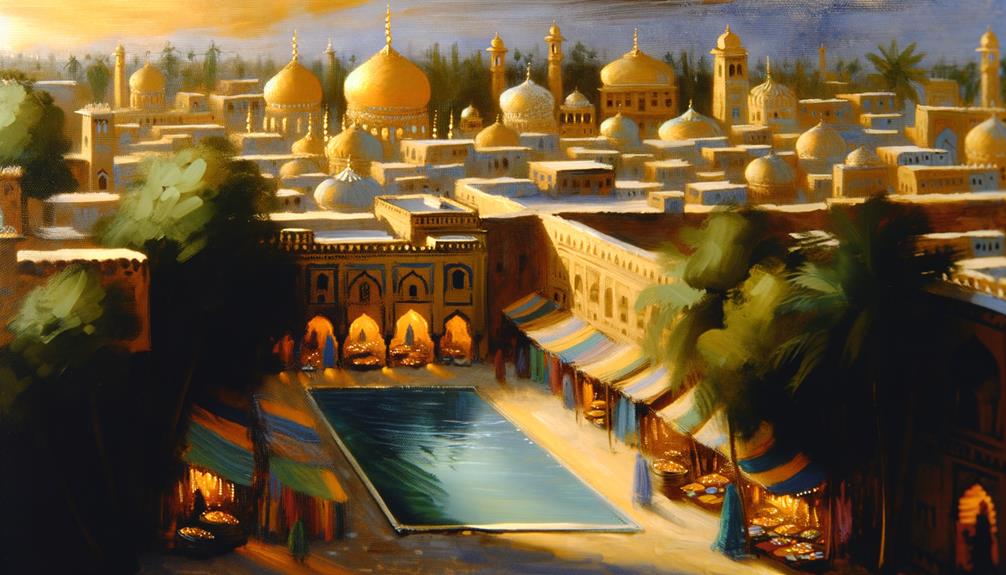Meaning of the Name Medina
The name Medina, originating from the Arabic word 'madīnah' meaning 'city,' traces back to the ancient city of Yathrib. Renamed Medina al-Nabi in the 7th century CE, it holds immense religious importance as the second holiest city in Islam and the final resting place of Prophet Muhammad.
Linguistically, it stems from the Semitic root 'd-y-n,' encompassing notions of urban life and governance. Medina is revered as a sanctuary during the Hijra and remains a pivotal destination for millions of pilgrims annually.
To uncover more about its cultural and historical depth, more information awaits.

Key Takeaways
- Medina originates from the Arabic word 'madīnah', meaning 'city'.
- The name is derived from the Semitic root 'd-y-n', which is associated with judgment and law.
- Medina signifies 'The Radiant City' due to its historical and spiritual luminescence.
- It was renamed Medina al-Nabi (City of the Prophet) in the 7th century CE.
- Medina is the second holiest city in Islam and a major pilgrimage site.
Historical Origins
The name 'Medina' traces its historical origins to the ancient city of Yathrib, which was re-named Medina al-Nabi (City of the Prophet) in the 7th century CE following the migration of the Prophet Muhammad. This event, known as the Hijra, marked a significant transformation in the city's identity and stature.
Linguistically, 'Medina' derives from the Arabic root 'd-y-n,' meaning 'city' or 'town,' reflecting its urban characteristics and evolving socio-political significance. Historically, Yathrib was a settlement with a diverse population, including various tribes and clans.
The renaming signified not only a change in nomenclature but also a shift in cultural and religious influence, anchoring Medina's pivotal role in Islamic history and its enduring legacy.
Religious Significance
Medina, historically known as Yathrib, holds profound religious significance as the second holiest city in Islam after Mecca.
It is not only the site of the Prophet Muhammad's migration (Hijra) but also the location of his final resting place within the Prophet's Mosque (Al-Masjid an-Nabawi).
The city's role as a pivotal destination for millions of pilgrims annually underscores its enduring importance in Islamic tradition and practice.
Historic Islamic City
As one of the holiest cities in Islam, this ancient metropolis holds profound religious significance, being the final resting place of the Prophet Muhammad and the site of pivotal events in early Islamic history. Medina, originally known as Yathrib, became a sanctuary for the Prophet and his followers during the Hijra, marking the dawn of the Islamic calendar.
Its name, 'Medina' or 'Al-Madinah Al-Munawwarah,' translates to 'The Radiant City,' symbolizing its spiritual and historical luminescence.
- The Prophet's Mosque (Al-Masjid an-Nabawi)
- The Battle of Uhud
- The Trench (Khandaq) Battle
- The first Islamic state establishment
- The resting place of many Sahabah (companions of the Prophet)
These elements underscore Medina's unparalleled role in shaping Islamic civilization.
Pilgrimage Destination
Serving as a pivotal pilgrimage destination, Medina attracts millions of Muslims annually who seek to perform religious rites and deepen their spiritual connection. Historically, Medina, or Al-Madinah Al-Munawwarah, is revered as the city where the Prophet Muhammad established the first Islamic state and where he is also buried.
The Masjid an-Nabawi, or the Prophet's Mosque, stands as a central site of pilgrimage, second only to Mecca. The term 'Medina' itself, derived from the Arabic 'Madinah,' signifies 'city,' yet its religious connotation implies 'the radiant city' due to its association with the Prophet.
This dual significance—both historical and linguistic—cements Medina's role as an essential locus for Islamic piety and communal unity.
Linguistic Roots
Tracing its etymology, the name 'Medina' finds its origins in the Arabic word 'madīnah,' which translates to 'city' or 'town.' This linguistic root is deeply intertwined with the historical and cultural fabric of the Arab world.
The term 'madīnah' itself is derived from the Semitic root 'd-y-n,' which conveys notions of judgment, governance, and settlement. Over centuries, 'madīnah' evolved to represent both physical urban spaces and the broader concept of communal living.
- Historical resonance: evokes images of ancient civilizations
- Cultural significance: underscores the rich Arab heritage
- Communal unity: emphasizes collective identity and governance
- Semantic depth: invites exploration of language and history
- Timeless relevance: bridges past and present contexts
This linguistic journey enriches our understanding of Medina's profound historical legacy.
Cultural Impact
Building upon its linguistic roots, the name Medina extends its influence through a multifaceted cultural impact that spans centuries and continents.
Historically, Medina holds significant religious importance in Islam as the city where Prophet Muhammad established the first Muslim community and where he is buried. This sacred association has made the name Medina emblematic of Islamic heritage and spirituality.
Linguistically, the term has permeated various languages, symbolizing sanctuary and communal living. Across the globe, cities and towns named Medina often reflect this heritage, serving as cultural hubs where history and tradition converge.
The name therefore carries profound implications, resonating deeply within communities that value its historical and spiritual connotations.
Modern Usage
In contemporary times, the name Medina continues to be widely used, often signifying a connection to cultural heritage and religious significance. The name’s historical resonance is particularly pronounced in Islamic contexts, where Medina denotes the second holiest city in Islam. Linguistically, ‘Medina’ translates to ‘city’ in Arabic, embodying urbanity and community. The enduring use of the name Medina across various cultures reflects a shared appreciation for its deep-rooted significance in history and spirituality. In many regions, it symbolizes not only urban life but also the rich tapestry of community bonds that define city living. This is further enriched by the exploration of the meaning and origin of kota, which also translates to ‘city’ in several languages, emphasizing the universal value placed on communal habitation.
Emotionally, the name evokes:
- Reverence for sacred traditions.
- Pride in cultural identity.
- Unity within the Muslim ummah.
- Respect for historical legacies.
- Spirituality connected to Islamic teachings.
Notable Namesakes
Among the notable namesakes of Medina, a significant figure is Medina al-Munawwarah, the revered city in Saudi Arabia known for its profound religious importance in Islam.
Medina al-Munawwarah, often simply referred to as Medina, is the second holiest city in Islam, after Mecca. The term 'Medina' itself is derived from the Arabic word 'madinah,' meaning city, but its full name translates to 'The Enlightened City,' referencing its historical and spiritual significance.
The city is the burial place of the Prophet Muhammad, making it a pivotal site for pilgrimage. Additionally, the name Medina has transcended its geographical origins, inspiring various cultural and societal references, reflecting its broad influence in both historical and contemporary contexts.
Conclusion
The name Medina, steeped in historical origins and religious significance, weaves a tapestry of cultural and linguistic richness. Its roots trace to ancient lands, echoing through centuries with profound impact.
In modern times, Medina continues to resonate, manifesting in various cultural contexts and notable namesakes. The enduring legacy of Medina, like a timeless melody, harmonizes the past with the present, creating a symphony of meaning that transcends generations and geographical boundaries.






